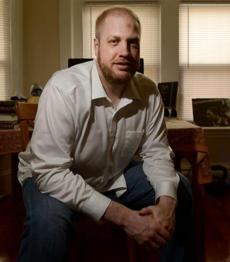 William Suhaib Webb, imam of the Islamic Society of Boston Cultural Center in Roxbury, has been a target of conservative Muslims on the Internet, who call him a sellout, and of other critics who say he is an extremist.
William Suhaib Webb, imam of the Islamic Society of Boston Cultural Center in Roxbury, has been a target of conservative Muslims on the Internet, who call him a sellout, and of other critics who say he is an extremist.
He has tried, for better or for worse, to respond to all of it — in his sermons, on CNN, on Twitter. At the same time, he has endeavored to improve the mosque’s relationships with Jewish and Christian leaders in Boston.
“I’m just exhausted,” the 40-year-old Webb said, sipping a flask of coffee in his book-lined office overlooking the busy intersection of Tremont Street and Malcolm X Boulevard. “I don’t have days anymore. I just have . . . smears.”
Webb, who memorized the Koran while living with his parents in Oklahoma and became an advanced Islamic legal scholar after years of study in Cairo, has in recent years become among the most famous imams in America.
He has 34,000 Twitter followers and a “virtual mosque” website that gets some 13,000 page views a day. In his sermons and in social media, Webb — many followers call him “sheikh,” an honorific for a respected teacher — toggles effortlessly between English and Arabic, dropping words like “baller” and references to “The Walking Dead,” a television show about zombies, into exegeses of Sufi poetry.
When he came to the cultural center 18 months ago, he faced significant challenges. He had to connect with immigrants from all over the world, as well as their US-born children and converts from other faiths. He also had to be a bridge to the city’s other faith communities, someone who could help the city move beyond concerns, particularly among some Jewish leaders, that the mosque’s leadership had extremist ties.
Webb, for his part, had his own big plan — to establish one of the first Muslim seminaries in the country. He wanted to nurture a new generation of American imams and Muslim women scholars — orthodox, but culturally conversant and civically involved — and to educate more casual students about their faith.
The Marathon bombings cast Webb and his mission into a crucible. In the media, Islam was on trial again, and Webb was, too.





